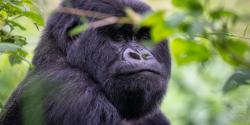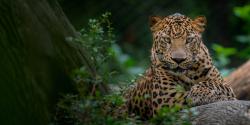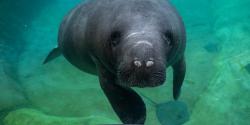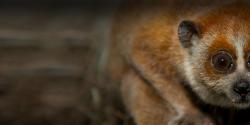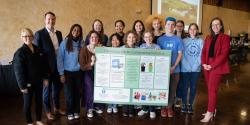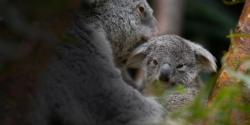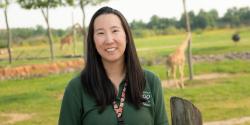Powell, OH – There was a flurry of activity overnight at the Columbus Zoo and Aquarium as staff welcomed two little ones—an Asian elephant calf and a California sea lion pup! These exciting births are important milestones and offer hope for the future of these species that are at risk in their native range.
“There are so many reasons why these births are cause for celebration. Certainly, these babies are adorable, but they also represent the science, expertise, and collaboration across internal teams and other facilities as we collectively work to help protect these incredible species. A very special thanks to the staff whose hard work and dedication helped to produce these results! We are also proud to share the fantastic news of the arrivals of the elephant calf and sea lion pup with our community, and we thank everyone for their continued support so these efforts can be possible,” said Interim Columbus Zoo President/CEO Jerry Borin.
Asian Elephant Calf
On Wednesday, June 16, 2021 at 8:48 p.m., the Zoo welcomed the much-anticipated birth of a male Asian elephant calf in the Zoo’s Asia Quest region.
As an experienced mother, 33-year-old Phoebe is providing exceptional care to her big bundle of joy. The calf appears to be strong and was observed nursing shortly after birth. While he currently prefers to stand closely between Phoebe’s legs, the calf is also starting to be curious of his surroundings behind the scenes in the Zoo’s elephant and rhino building. He is rather vocal, sometimes emitting a low grumble, and he continues to test out his trunk though he hasn’t quite yet sure figured out how to use it to its fullest potential. Phoebe has remained patient with him and calmly responds to the care team as they observe her and her baby.
Throughout her 22-month pregnancy, the Zoo’s Animal Care team monitored Phoebe closely. Thanks to the incredible bond she shares with her care team Phoebe voluntarily participated in regular ultrasound imaging, which enabled staff to monitor the calf’s development.
The purchase of endocrine equipment in 2018 by donor, Johanna Destefano, allowed the Animal Health team to run daily progesterone tests for Phoebe so they could more accurately predict the birth. On Sunday, June 13, Phoebe’s bloodwork showed that her progesterone levels had dropped enough that the Animal Health and Animal Care teams knew that the birth would happen sometime within the next 72 hours. The Animal Care team shifted from checking Phoebe via remote camera every two hours to monitoring her around the clock and working overnight shifts in the building, where they could be ready to assist as necessary.
Phoebe’s delivery went smoothly, and the arrival of this recent calf is also offering hope for Asian elephant conservation efforts. The pairing of Phoebe and 33-year-old father, Hank, was recommended by the Species Survival Plan® (SSP), a program coordinated by the Association of Zoos and Aquariums (AZA) to maintain genetic diversity of threatened and endangered species in human care. While Phoebe and Hank had the opportunity to breed, this has been unsuccessful in the past and she was artificially inseminated. Artificial insemination is carefully coordinated by animal health experts and enables an elephant to be impregnated at her most fertile time. While this is still a relatively rare procedure for elephants, most successful elephant artificial insemination attempts (approximately 20 in total) have occurred with African elephants. Artificial insemination is very uncommon with Asian elephants, with less than 10 successful outcomes. Two of these scientific achievements have occurred at the Columbus Zoo (with the first time occurring in Phoebe in 2016). Attempts to artificially inseminate elephants are becoming more frequent to bolster the numbers of endangered elephants, whose populations continue to rapidly decline in their native range.
Phoebe came to the Columbus Zoo in January 2002 and resides alongside the other five Asian elephants in the Asia Quest region—males Hank (this calf’s father) and Beco (Phoebe’s son), and females Connie, Sunny and Rudy. This calf is Phoebe’s fourth calf born at the Columbus Zoo and her fifth calf overall. Her last calf, Ellie, sadly passed away a few weeks after her birth in 2018 due to a bacterial infection despite aggressive treatment by the Animal Health team and outside specialists. Just two other live Asian elephants have been born at the Columbus Zoo throughout the Zoo’s history–Bodhi, who was born in 2004 and now resides at Denver Zoo, and Beco, who was born in 2009 and is still a part of the Columbus Zoo elephant herd.
To provide Phoebe and her new baby with time to continue developing a strong bond, they will remain in a behind-the-scenes area. When they show they are ready, they will also slowly be introduced to other members of the herd. The Zoo will announce viewing information—as well as more information about the calf’s name—for guests as it becomes available.
According to the International Union for Conservation of Nature (IUCN) Red List of Threatened Species,™ Asian elephants are listed as endangered in their native range across southern and southeastern Asia and are in decline due to various factors including habitat loss/degradation and poaching. The World Elephant Day organization estimates there are fewer than 40,000 Asian elephants and less than 400,000 African elephants remaining worldwide.
The Columbus Zoo and Aquarium is a long-time supporter of several direct elephant conservation initiatives benefitting both African and Asian elephants, including annual donations to the International Elephant Foundation and several research projects and grants over the last 25 years. Many of these projects have focused on reducing human-elephant conflict and monitoring elephant populations in their native ranges. Additionally, Columbus Zoo staff leads AZA’s SAFE (Saving Animals From Extinction) Asian Elephant Program, an AZA initiative to leverage their large audiences and collective expertise to save animals from extinction. Zoo guests can also learn about elephant conservation and how they can contribute to the sustainability of this endangered species at the Zoo’s Elephant Conservation Station inside the “Vanishing Giants” building located in the Asia Quest region. Zoo veterinary staff also participate in a national Elephant Endotheliotropic Herpesvirus (EEHV) advisory group. The group aims to prevent, diagnose and treat this potentially fatal disease that affects elephants in their native range, and in human care.
California Sea Lion Pup
During the early morning hours of June 17, 2021, the Zoo’s Pinniped team in the Adventure Cove region also had cause to celebrate with the arrival of a sea lion pup!
The pup was born to experienced mom, Lovell, who will be turning 6 years old in July. Lovell is being very attentive to her nursing pup, whose sex has not yet been determined. The pup is already quite active but won’t be ready for swim lessons with mom until Lovell determines her calf is ready. For now, they will continue to bond behind the scenes.
Lovell arrived at the Zoo along with nine other sea lions (six males, three females) and four harbor seals (one male, three females) on May 17, 2020. Because the sea lions all live together for most of the year in a strong social group and there are several males, the father of the pup is currently unknown and will be determined through a blood test.
This most recent pup is the third sea lion pup ever to be born at the Columbus Zoo and Aquarium. The first sea lion pup, a female named Sunshine, was also born to Lovell on June 25, 2020. Sunshine still resides at the Columbus Zoo and has become independent of Lovell, making friends with other sea lions. The second sea lion pup at the Columbus Zoo was born to mom, Baby. When the team noticed that male pup, Norval, was not gaining enough weight, they stepped in to assist Baby by providing Norval with supplemental tube feedings. He continues to thrive, and Columbus Zoo guests can sometime catch him with Sunshine and another sea lion, Banana.
Guests can find the sea lions at the Zoo’s newest region, Adventure Cove, which opened in 2020. Thanks to the support of voters who passed the last levy and contributions from generous donors, the Columbus Zoo began construction in October 2017 on this brand-new, state-of-the-art region. Adventure Cove features a Pacific Northwest-inspired rocky coast and harbor setting for the sea lions and seals; Jack Hanna’s Animal Encounters Village, a colorfully-themed and immersive village highlighting animals from all around the world; and updated existing attractions.
Adventure Cove also furthers the Zoo’s commitment to sea lion rehabilitation initiatives led by institutions accredited by the AZA. The Columbus Zoo has provided financial support for years for rescue and rehabilitation efforts by The Marine Mammal Center (MMC) in Sausalito, Calif., and the Zoo’s Animal Health staff have trained with the MMC to nurse stranded and injured marine mammals back to health while expanding their knowledge of sea lions and seals.
Although California sea lions are not listed as a species of concern, the situation for sea lions in their native range is increasingly dire because there are a rising number of pup strandings. As climate change forces the mothers to hunt further away from shore, more of them are not coming back, leaving pups orphaned and unable to care for themselves. The MMC takes in many of these animals and works to restore them to health.
While Lovell and her pup will likely stay in the behind-the-scenes area for the near future to continue to bond and so that Lovell and the sea lion care team can ensure that the baby meets all of the important growth and development milestones (including swimming) before graduating into the larger habitat, guests who reserve a Behind the Marina Sea Lion Tour will have the opportunity to catch a glimpse of the pair and learn more about this intelligent, playful species. The experience is one of several new offerings designed to further inspire guests to connect with wildlife and take action to help protect these species’ future. Additional information can be found on the Zoo’s website under the Tours and Virtual Experiences page
For further updates about Phoebe, Lovell, and their newborns, be sure to follow the Zoo’s social media accounts on Facebook, Instagram and Twitter.
###
About the Columbus Zoo and Aquarium
Home to more than 10,000 animals representing over 600 species worldwide, the Columbus Zoo and Aquarium leads and inspires by connecting people and wildlife. The Zoo complex is a recreational and education destination that includes the 22-acre Zoombezi Bay water park and 18-hole Safari Golf Course. The Columbus Zoo and Aquarium also manages The Wilds, a 10,000-acre conservation center and safari park located in southeastern Ohio. The Zoo is a regional attraction with global impact, annually contributing privately raised funds to support conservation projects worldwide. A 501(c)(3) nonprofit organization, the Columbus Zoo has earned Charity Navigator’s prestigious 4-star rating.

